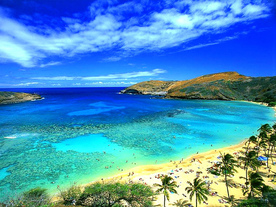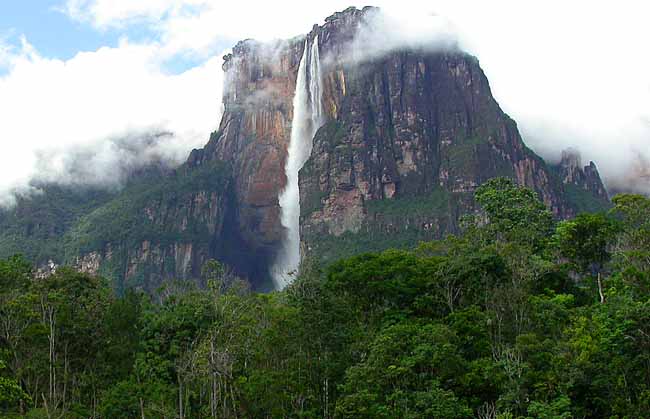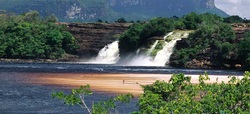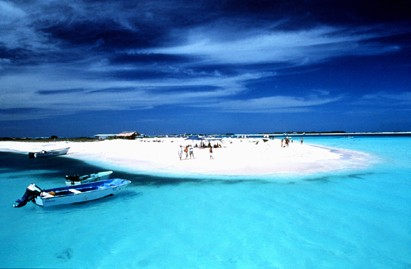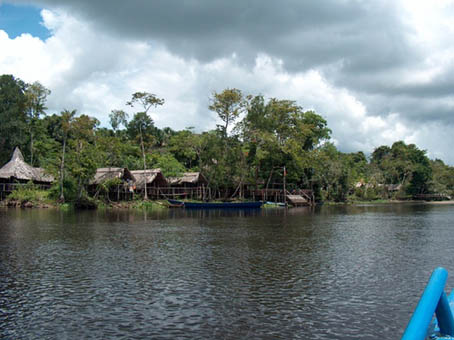PeopleThe Caribs, the Chibchas and the Arawaks, who were predominantly farmers, hunters and fishermen, inhabited Venezuela early. The Mariches, who descended from the Caribs, were among the first to convert to Christianity upon the arrival of the Spaniards. Today, there are about 26 million Venezuelans, and most are city dwellers.
Most of the present day Venezuelans are mestizos-the results of intermarriages among local Amerindians and Europeans, while the rest have Spanish, Italian, German or Portuguese blood. There are also Venezuelans of African or Asian descent. |
Venezuela is a beautiful country with beautiful people. In fact, Venezuelans have received five Miss World, six Miss Universe, and five Miss International titles, perhaps more beauty pageant winners than any other nation. But it is also a favorite stop for tourists who wish to discover the joys of the Caribbean. Located on the South American northern coast, it is also a rare mix of city charm and mysterious jungle, with hundreds of pleasant surprises along the way that never fail to please. Venezuela is a highly urbanized country, with plenty to offer in terms of sun and sea. A Spanish adventurer named Alonso de Ojeda named Venezuela. After seeing the houses that local inhabitants built on stilts over Lake Maracaibo, Ojeda referred to it as 'Venezuela' or Little Venice. Today, visitors discover that Venezuela is so much more than just lakes and rainforests. People who come to Venezuela for an unforgettable tropical vacation come away with an experience they will never forget. |
Geography
Venezuela is comprised of the mainland and many islands just off the coast, sharing borders with Guyana, Colombia and Brazil. Landscapes vary widely, from calm coastlines and extensive plains, to mountainous regions and lush, remote rainforests.
Although considered tropical, Venezuela offers a few surprises in terms of climate. Low-lying areas and plains are often humid while areas with higher elevations have very low temperatures, and occasionally, some areas may even have snow. Temperature variations tend to fluctuate more in areas lying in the temperate latitudes, and in low elevation areas, temperatures can go up to a rather hot 82F.
Although considered tropical, Venezuela offers a few surprises in terms of climate. Low-lying areas and plains are often humid while areas with higher elevations have very low temperatures, and occasionally, some areas may even have snow. Temperature variations tend to fluctuate more in areas lying in the temperate latitudes, and in low elevation areas, temperatures can go up to a rather hot 82F.
Famous AttractionFor nature lovers, Venezuela has more than 40 natural parks and numerous biosphere reserves. For archeology buffs, the Canaima National Park offers one of the oldest geological formations. For sun worshippers, the beaches in metropolitan Caracas offer plenty of attractions, action and adventure. Further northeast you will find some of the most famous beaches in the country, particularly those in Mochina National Park. Diving and snorkeling enthusiasts should also pay a visit to Parque Nacional Morrocoy, located northwest of Caracas.
Venezuela is also home of the world's highest waterfall, Angel Falls. There are also islands off the coastline to explore, including Isla de Margarita, just 40 km from the mainland. For a deep jungle adventure, you can explore a portion of the Amazon rainforest. Although remote, it's worth a visit to experience its unique flora and fauna. |
HistoryVenezuela was already inhabited for many thousand years when the Spanish colonizers came in 1522. Most of the natives were converted to Roman Catholicism despite dissension among the natives.
It was only after Simon Bolivar helped liberate Venezuela that sovereignty was achieved to some extent. A rebellion in 1830 finally allowed Venezuela to proclaim itself as a republic. After that time, Venezuela was ruled by dictators, although certain reforms were initiated that led to economic growth. A democratic government later replaced dictatorship. During the First World War, oil deposits were discovered, allowing Venezuela to enjoy an economic boom. This boom attracted immigrants from Europe, including Spain, Portugal, and Italy, but unfortunately, the dip in oil prices, along with the growing national debt, contributed to an economic decline. Today, however, Venezuela is one of the world's top producers of crude oil and has an active manufacturing industry. |
NightlifeMost of the nation's top bars, clubs, lounges and restaurants are in Caracas, where a variety of shows and features are presented on most nights. Clubs and bars usually open from 9 p.m. to about 2 a.m. and most charge very reasonable entry fees. Discotheques open a little later and usually don't close until around 4 a.m.
For a different view of Venezuela, you might want to try Merida, a popular destination for backpackers. Nightlife is as exciting here as it is in the capital and bar entry fees are very cheap. Try La Cucaracha Racing Bar, El Bodegon de Pancho and Alto Prado. |
Culture
Venezuelan culture is a mix of Spanish, African, and indigenous influences quite prevalent in the art, crafts, and architecture. The dance and musical styles are also as widely diversified, with obvious differences from region to region. Such Venezuelan artists as Yucef Merhi, Arturo Michelena, Jesus-Rafael Soto, Carlos Cruz-Diez, and Armando Reveron have become recognized internationally.
The dominant language in Venezuela is Spanish, the official national language. However, because of the variety of ethnic groups in the region, there are also about 30 languages spoken in many areas, including Guajibo, Warao and Pemon.
The dominant language in Venezuela is Spanish, the official national language. However, because of the variety of ethnic groups in the region, there are also about 30 languages spoken in many areas, including Guajibo, Warao and Pemon.
CuisineVenezuelan cuisine is a mix of indigenous, African, and European tastes, with flavors, cooking styles and the use of certain food ingredients brought by immigrants and later refined to become an integrated taste that is distinctly Venezuelan. You will find that dishes are often flavorful and quite delicious, with a few pleasant surprises along the way.
As the capital city, Caracas arguably has some of the best choices in terms of variety of dining experiences, but you should also explore the offerings in other urban and suburban areas. Regardless of your location, you should not leave Venezuela without trying pabellon, a dish comprising of rice, banana, and black beans flavored with shredded meat. Corn-based goodies such as the cachapa and arepas are also very popular. Cachapa is the local version of the pancake, made from sweet corn and accompanied with cheese, while arepas is a type of biscuit. |
Qunar

